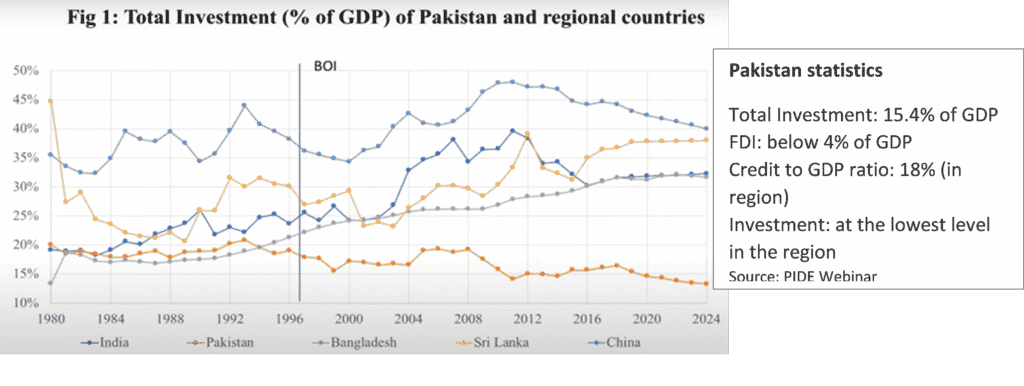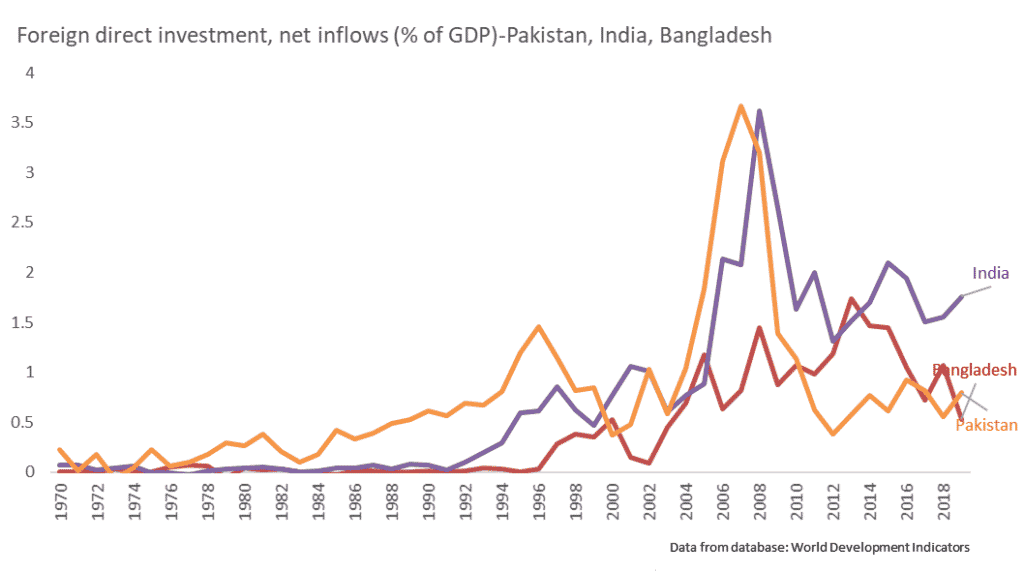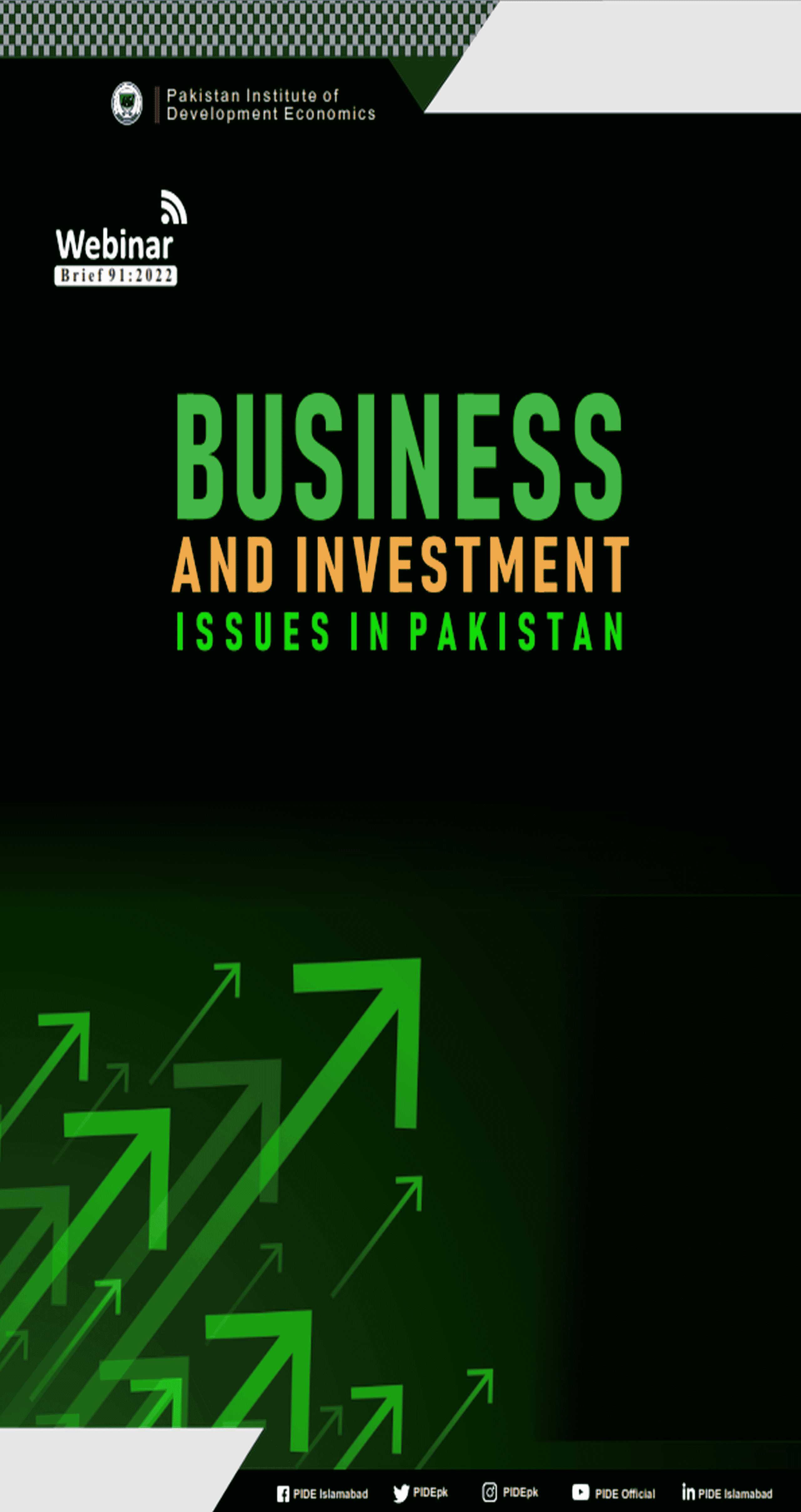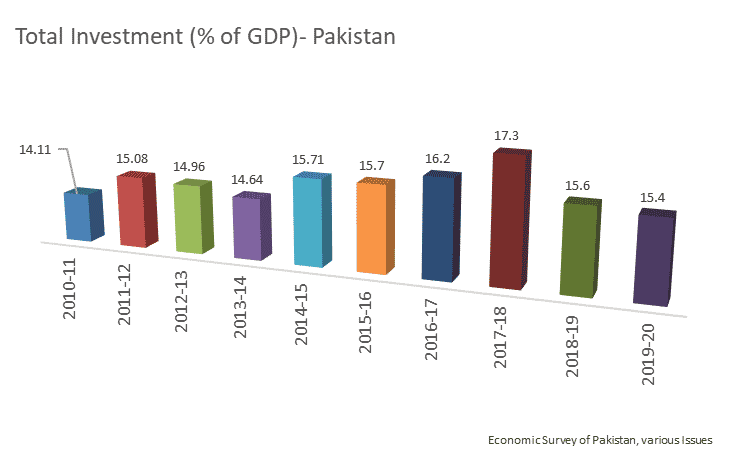Business and Investment Issues in Pakistan
Business and Investment Issues in Pakistan?[1]
Usman Ahmad, Amena Urooj, Uzma Zia
The economic history of Pakistan dominance with fragile industrial base, agriculture dominance, and political instability. Although, policies in the past were meant to strengthen the industrial base and for the protection domestic industries, country adopted a restricted trade regime. The government nationalized various industries and privatization program commenced to large scale nationalization in 1972-77. The utmost purpose of privatization program was to encourage private-ownership and to attract foreign investment. Gradually government adopted measures of trade liberalization to encourage exports in each regime. Key measures were devaluation of the Pakistani rupee, elimination of the export bonus scheme, and the discontinuation of restrictive licensing scheme (dismantled of license raj in 1990s) and steps were taken to stimulate exports of manufactured products.
| Global business outlook -Ranking in global ease of doing business 108th (Source: Doing Business 2020” by WB group) -Ranking in GCI: 107th (2018) (Source WEF) -Skilled persons emigrated: About 1.18 million (since 2018) [Source: Bureau of Emigration & Overseas Employment (2019)] |
Although businesses faced multiple challenges in both short-run and long-run. The government focusing on enhancing the role of private sector and tried to enhanced competitiveness in the economy. There has been talk of furthering liberalization, deregulation, and reduction in the cost of doing business since then. Glancing at the facts and domestic business potential likely indicates that businesses have missed a high proportion of potential investment opportunities. Board of Investment (BOI) was established in 1997 and since developed five offices one in each province, however, investment has not increased in Pakistan. Evidently, the problem is not promotion of investment for which we developed a large infrastructure in the form of BOIs and that was the subject of several PIDE webinars.
__________________________
[1] PIDE Webinar (2020), Why Businesses Don’t Grow in Pakistan (Speakers: Atif Bajwa, Waleed Saigol, Alman Aslam, Mohsin Iqbal)
PIDE Webinar (2020), Retail-The Neglected Sector (Speakers:Yasin Paracha, Asfandyar Farrukh, Wasif Butt)
PIDE Webinar (2020), Unpacking Investment Crisis in Pakistan (Speakers:Haroon Sharif, Almas Hyder, Dr.Wang Zhihua & Ishaq Burney)
 Total investment in Pakistan is at 15.4% of GDP which is just the replacement investment. In the region Pakistan has always ranked the lowest (see figure 1). It is indeed worrisome that India and Sri Lanka has an investment GDP ratio of over 30 % and China over 40%. This issue should be the matter of policy concern.
Total investment in Pakistan is at 15.4% of GDP which is just the replacement investment. In the region Pakistan has always ranked the lowest (see figure 1). It is indeed worrisome that India and Sri Lanka has an investment GDP ratio of over 30 % and China over 40%. This issue should be the matter of policy concern.
Most large companies in Pakistan are government owned or multinationals. The question is why does our private sector corporates not grow? Market capitalization[2] , being an important indicator, is in the hand of 5 top companies (OGDC, MCB, NESTLE, PTCL, ENGRO). Comparing businesses in South Asian region, India have 2 companies/businesses over hundred billion while Pakistan have no company/business over five billion. A broad overview explained reality that Pakistani companies growing at slower pace. Few top businesses have grown their consolidated sales 2-3 times, but others are still looking forward to grow.
Is growth the only fundamental problem for Pakistan? Nationalization in past damaged the business attitude. Business sentiment is at the lower end and the country will never grow until it become core value from top to bottom. Policies do not grow in Pakistan as it has become a victim of manifestation of the system and non-conducive work culture. Businesses are running in an environment where business community is forced to take actions for their existence in the market not on growth. The un-thoughtful policies, environment of distrust and currently economy of Pakistan fall lowest in investment and maintaining the lowest credit to GDP ratio (Pakistan 18%, Bangladesh 47%, and India 50%). Comparing the FDI inflow in Asia; India has the leading role while Pakistan and Bangladesh stand lower. For Pakistan most of FDI inflow coming from Hong Kong and China, the power, finance and oil sector have almost 70% share of the total FDI in country. There are structural flaws and disconnections between institutions at federal and provincial level. Pakistan has a grim vacuum of policies as no conclusive growth policy, industrial policy, and export policy exist. Pakistan unfortunately failed to demonstrate big investment transaction in last several years like RECODEC, and KARKEY, Bahawalpur solar project. The ultimate solution is to rely on private sector to run some economic zones. SEZs and Provision of utility services is important to attract foreign investors.
__________________________
[2] Looking at the market cap can be misleading. Some data is misleading as Pakistani companies face devaluation.
Factors inhibiting investment:
Some impressive economic performance was observed between 2002-07 but the country is facing difficult time since last few years. Currently being under IMF program, their interventions, and recent COVID-19 devastation the country is encountered with volatile policy structure. Macroeconomic stability is still far away and economy still has to restore confidence of domestic, international investors and financial institutions. The recent tax issues created lack of trust of businesses in public policies, while public deficit has made policies more volatile. The cities like Karachi, Lahore, Faisalabad, Sialkot are the main industrial centers, can provide investment opportunities. The sea route in Sindh and Balochistan is expected to contribute in economic growth through business growth. Frequent changes in taxes and the lack of trust in public policies has kept the country in low investment levels and the country is unable to attract foreign investment. Pakistan has also lost its advantage in international trade by continuing to depend upon low-tech products. Private sector players have attuned themselves to the new realities of global markets. Favorable trade, investment, and openness policies can contribute well in the growth dynamics.
| Business Environment (Pakistan) EDBI ranking: 147th (2018) Retail sec. Growth: 7% in 2017-18. Source: PBS Online business:1% of total retail. Source: PBS Organized sector growth: 20-25%. Source: PIDE webinar. |
Volatile policies effect business and investment:
Nationalization in past damaged the business attitude. Business sentiment is at the lower end and hampers continuous growth. Policies do not respond well in Pakistan as they have become a victim of manifestation of the system and non-conducive work culture. To achieve economic stability, Pakistan needed IMF support several times (21 times before the recent one) and had to fulfil fiscal adjustment demands (Soch Bichar, 2019). Tax rates are high and changed through SROs or mini budgets (PIDE policy viewpoint no.17). Businesses are running in an environment where business community is forced to take actions for their existence in the market not on growth. The ultimate solution is to rely on private sector to run some economic zones which are important to attract foreign investors.
 Hunger for FDI and excessive hurdles on domestic investment
Hunger for FDI and excessive hurdles on domestic investment
Investment can be from any source, in fact, when domestic investors are rushing to invest foreign investors are attracted. Unfortunately, FDI has been in focus by almost all governments whereas it has always been quite low, not even on 4% of GDP, and this situation is even with other neighboring countries too. Thus, the investment does not only depend upon FDI but the domestic investment also plays a role in any country’s growth. The cause of low domestic investment as per PIDE’s observation (PIDE’s webinar) is that businesses do not grow in Pakistan, retail is primitive, stock market is weak, stabilization does not work and construction activity is not supported. This all is due to self-centered policy or reactive policy. Hence, without allowing the domestic commerce as under mercantilism, foreign investment cannot be attracted.
Onerous and expansive tax policy:
The tax system is not virtuous as role of Federal Board of Revenue (FBR) is considered as a provocative. Many barriers to entry in the market exist because the policies are not supportive to business industry. Tax policy is burdensome and complicated, and taxes are revised every year to meet unrealistic targets (PIDE policy viewpoint no. 17). The short-term goals of the tax machinery, and corruption hurt the businesses and discourage investments. Governments’ inconsiderate policies are problematic as no vision exists, and no intellectual property laws are there. Startups face problems in registering themselves outside Pakistan. No formal planning is on board but in fact, abuse of policies is a common practice. Risk taking and innovation is not our culture. There must be a platform to get them registered and to pay taxes conveniently.
Non-professional and talent repellent behavior:
Pakistani diaspora is working better in global business but lacking quality of Human Resource (HR) internally. Business narrative must be clear then any business in a country can perform well as in case of Citi Bank, Engro, Nishat and others. Pakistan has talent but appears to be a talent repellent country. Due to limited opportunities; human resources are not thoughtful, and get wasted. Companies who think globally do flourish but such motivated approach is in-existent in Pakistan at any level. The organizational culture is missing which talk about custom experience and values. Other countries like China, Korea, Taiwan all have faced similar issues once, but over the period of time and with effective policies, they have developed human capital and organizational culture. Pakistani business culture is more dominated by elite who control our economy and that leads to rent seeking.
Control over business and equity:
Pakistan economy is a politically captured economy, cartels are formed by businesses to get market power and further exploitation. They are not willing to use equity market for growth and remain too focused on controlling business. In this scenario the informal economy grows by staying out of formal structures. Environment of lawlessness, lesser trust, and Statutory Regulatory Orders (SRO) lobbying is prevailing in the country (PIDE Knowledge Brief, 2020). The investment in the country, foreigners are neither approaching in nor investing. They consider the political and interior security system in Pakistan is opaque, making their capital unsafe or they seek local partnership. The overall environment is not conducive for business. Community despite of having passion and being innovative are unable to grow economically due to non-availability of formal platform for exposure and lack of research and development is an added issue.
Seth culture exist:
Woefully business environment of Pakistan is captured in family owned business (seth culture). When the nationalization was adopted, the family-oriented businesses had become inward looking. Over years, they have earned huge profits and became elite as they managed this culture well. Bribing and black marketing is almost unavoidable in the local culture and has led them to grow inappropriately. No domestic competition exits in such environment, elite groups know how to work within this environment and how to take best advantage. Some businesses are growing as Multi-National Companies (MNCs) but in non-conducive environment e.g. tax, policy, patents, input policy. Industrial groups need facilitation to introduce transparency and competitiveness. To spur innovative solutions, cultural shifts and opening up for Information Technology is a requisite.
Recommendations:
- Restore confidence of domestic, international investors and financial institutions. There is a need to attract foreign investor policies which should be consistent.
- Tax reforms are direful need of this time as onerous and expansive tax policy failed to bring business and people in tax net.
- Business narrative must be clear to figure out important issues and to bring country in top rankings.
- Captured economy should be revitalized to allow business to grow well.
- Encouraging the use of equity market for growth of business should be a focus rather than control over business.
- Competitive environment must be encouraged.
- Industrial groups are needed as they may make environment transparent and competitive.
- Cultural shifts and opening up for Information Technology is recommended.
Reference
- Bureau of Emigration & Overseas Employment (2019), Annual Analysis of Manpower Export, Islamabad (https://beoe.gov.pk/files/statistics/yearly-reports/2019/2019-full.pdf)
- Doing Business (2020), The World Bank Group.
- Doing Taxes Better: Simplify, Open and Grow Economy (2020), PIDE policy viewpoint no.17.
- Economic Survey, Pakistan, various issues, Government of Pakistan.
- PIDE Knowledge Brief (2020), No. 15
- PIDE Webinar (2020), Why Businesses Don’t Grow in Pakistan, PIDE Website.
- PIDE Webinar (2020), Retail-The Neglected Sector, PIDE Website.
- PIDE Webinar (2020), Unpacking Investment Crisis in Pakistan, PIDE Website.
- World Economic Forum (2017).
- Soch Bichar (2019), Pakistan and the IMF. https://nhaquepod.podbean.com/?s=imf





